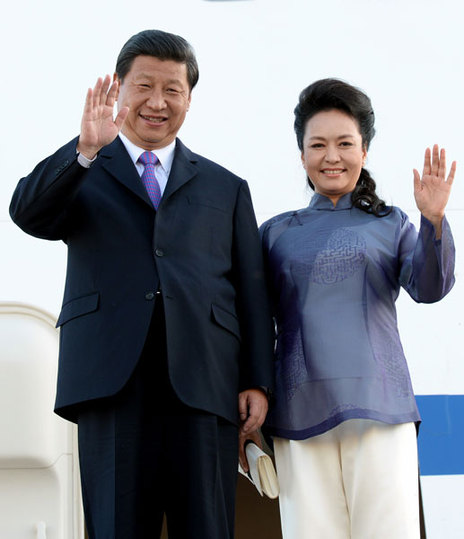Stakes high ahead of Xi-Obama summit
 0 Comment(s)
0 Comment(s) Print
Print E-mail China Daily, June 8, 2013
E-mail China Daily, June 8, 2013
Candor between China, US leaders expected at estate retreat meetings
The leaders of the world's two largest economies will look to develop their relations as they discuss a wide range of high-stakes issues at a retreat in southern California.
 |
| President Xi Jinping and his wife Peng Liyuan arrive in California on Thursday. [Xinhua] |
President Xi Jinping's plane touched down on Thursday night at Ontario International Airport, about 130 km northwest of the Sunnylands retreat, venue for the summit with US President Barack Obama.
Xi has completed a weeklong trip to three Latin American and Caribbean nations.
It will be the first meeting between the leaders since Xi took office in March and Obama began his second term in January.
They were scheduled to meet for several hours on Friday, followed by a private dinner. The talks will continue on Saturday morning before ending at noon.
Observers said the laid-back meetings will allow more scope for pragmatic conversation and candor. This will help build personal rapport and set a positive tone in developing a new type of major power relations and solving specific issues including economic and security problems.
Sources have said the summit has been discussed for some time. Initially, the earliest possible meeting for Xi and Obama would have been on the sidelines of the G20 Summit in Russia in September but both sides saw a need to advance the schedule.
Ruan Zongze, vice-president of the China Institute of International Studies, said that in agreeing to the unprecedented format for the meetings, Beijing has sent an important signal to Washington — it wants to engage.
"It is not the first time that Xi and Obama will have communicated with each other face to face, so what matters more than the format of the meetings is how both sides will map out the future of their relations," he said.
A White House official, speaking on condition of anonymity, stressed that Obama "invested a lot" in getting to know Xi when Xi visisted Washington, Los Angeles and Muscatine, Iowa, as vice-president in February last year.
Orville Schell, director of the Center on US-China Relations at the Asia Society, is hopeful that the practical attitude shown by Beijing and Washington in choosing the summit venue will help clear many hurdles that up to now made it difficult to achieve closer relations.
Xi and Obama are also expected to discuss building a new type of major power relationship, a topic put forward by the Chinese president. US leaders have welcomed the proposal, interpreting it as an effort to avoid the kind of rivalry between a rising power and an established power.
Jin Canrong, a professor in US studies at Renmin University of China, said China and the United States will not necessarily repeat history's "ruinous pattern" between a rising country and an established leading power.
Their economic interdependence, variety of official and public exchange channels, and high level of cultural tolerance have been unprecedented in history and can lay the foundations for an accommodative peace, he said.
Jim Wunderman, president and CEO of the Bay Area Council, a business-backed public policy organization in the San Francisco-Oakland-Silicon Valley area, said, "There are so many constructive things to do together and we think it is a new step that defiantly improves the engagement between China and the US."
However, many analysts believe the distrust between the two nations has deepened in recent years. China is concerned about the US "pivot to Asia" and feels it is being treated unfairly in the US in terms of investment, while Washington worries that a rising China will supplant its dominance in Asia and the world.
Recent US allegations of Chinese government involvement in cyberattacks have further fueled public suspicion of China. Beijing has denied these allegations.
Ann Lee, an adjunct professor at New York University and author of the book What the US Can Learn from China, said cybersecurity is being used as a smokescreen for more important discussions about geopolitical issues.
Yao Shujie, head of the School of Contemporary Chinese Studies at the University of Nottingham in the UK, said it is hard to avoid some friction between China and the US in the future, but a lack of cooperation and strategic trust will be bad for the two countries, the world economy and international peace.






Go to Forum >>0 Comment(s)